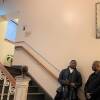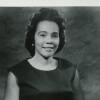I’ve spent the better part of 15 years or more speaking on the official holiday honoring the Rev. Dr. Martin Luther King Jr. I’ve pored over his speeches, articles and notes searching for the most appropriate quotes for each event. The Rev. Dr. King was a prolific writer and speaker, whose oratory was masterful and powerful. In tribute to Dr. King’s life and legacy, on this MLK Day holiday I went in search of words that would rebut this season of anger and hate.
“Somebody must have sense enough and morality enough to cut off the chain of hate,” he famously said, adding, “and you do that by love.”
It’s a testament to his brilliance that so much of what he said is still quoted or referenced. His observations articulating the horrors of the racially motived attacks like the water hoses and dogs aimed at children protesting in Birmingham in the '60s are also sadly applicable to the current environment of today’s neo-Nazi tiki torch marches, and police shootings of unarmed Black men.
“Our oppressors have used violence. Our oppressors have used hatred. Our oppressors have used rifles and guns.”
What’s more, some have willfully distorted Rev. King’s words, claiming his dream of the day “his 4 little children ... will not be judged by the color of their skin but by the content of their character” was his endorsement of a so-called "colorblind" society. They’ve cherrypicked that sentence from the rest of the "I have a dream" speech at the March on Washington — ignoring how he forcefully called out the nation’s failure to pay a promissory note to Black Americans and pressed for a check that paid it off with the “riches of freedom and the security of justice.” The one-dimensional Martin Luther King Jr. being celebrated now by so many is not the man once thought of “as the most dangerous man in America,” not the man philosopher Cornel West calls the “radical King.”
And that Rev. King, the clear-eyed strategist whose faith was boundless, was not immune to what he called the “inevitable setbacks here and there.” In a 1967 speech he warned, “There will be those moments when the buoyancy of hope will be transformed into the fatigue of despair.” I reread those words with a new understanding that despite his steadfast hope he was sometimes debilitated by the rabid opposition. One year after he delivered that speech, he would be dead — assassinated while standing on the balcony of the Lorraine Motel in Memphis.
We celebrate Dr. King’s 94th birthday in a virulently turbulent time. I am drawn to his unfailing rejection of the persistent racism and his confidence that “our determined refusal not to be stopped will eventually thrust open the door to fulfillment.” Hours before his assassination, Rev. King spoke to a packed house of Memphis’ striking garbage workers and supporters urging them to keep fighting, even as he predicted his own death. And then he uttered the powerful statement which I return to often, especially when I’m overwhelmed with battle fatigue.
“Only when it’s dark enough,” he said, “can you see the stars.”







